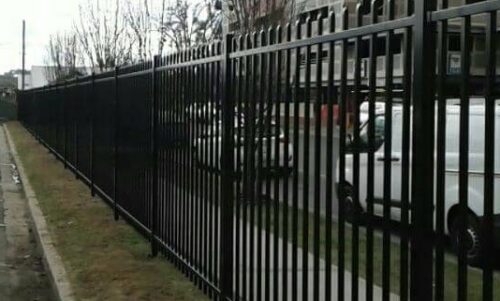Blog Overview:
The right fencing contractor should deliver quality workmanship, transparent communication, and dependable service. Evaluating credentials, materials, pricing, and timelines helps you choose a contractor you can trust.

Choosing the right fencing contractor is crucial to ensure your project is completed efficiently, effectively, and to your satisfaction. When evaluating options, look for proven partners like Jim’s Fencing. It’s essential to consider these 10 factors before making your final decision.
1. Experience and Expertise
Prioritize contractors with extensive experience and specialized expertise in the specific type of fencing you require.
- Longevity
A contractor with a long-standing presence has likely mastered effective solutions to various challenges. Contractors with a long history, like Jim’s Fencing, are often the safest bet.
- Specialization
Inquire about their specific experience with the materials (wood, vinyl, metal, etc.) and styles you are interested in.
- Validation
Review their portfolio and discuss past projects to gauge their proficiency in handling your specific requirements.
2. Licensing and Insurance
Protect yourself from liability by verifying the contractor’s credentials before work begins.
- Licensing
Verify that they hold the necessary licenses and permits mandated by your local authorities, demonstrating compliance with industry standards.
- Liability Insurance
Ensure they carry adequate liability insurance to protect your property in the event of accidental damage.
- Workers’ Compensation
Confirm they have workers’ compensation coverage, protecting you from financial responsibility if an employee is injured on your property. Request and verify proof of insurance validity.
3. Reputation and Reviews
Researching a contractor’s reputation is essential for making an informed decision about their reliability and customer service.
- Online Feedback
Utilize review websites and social media platforms to gather feedback. Pay close attention to themes regarding reliability, craftsmanship, and communication.
- Recommendations
Seek recommendations from friends, family, or neighbors who have recently undertaken successful fencing projects.
- Goal
A contractor with a consistently positive reputation is more likely to deliver quality and exceed expectations.
4. Portfolio of Work
A comprehensive portfolio serves as the best visual evidence of a contractor’s capabilities and craftsmanship.
- Quality Assessment – Review their portfolio to assess the diversity, complexity, and overall quality of their workmanship.
- Relevant Examples – Request to see examples of projects that are similar to yours in terms of material, style, and scope.
- Detail and Precision – Look for a high level of detail and aesthetic appeal evident in their installations.
5. Written Estimates and Contracts
Obtaining detailed documentation is crucial for accurate budgeting and preventing future disputes.
- Detailed Estimate – The estimate should clearly outline the scope of work, materials used, labor costs, project timeline, and any additional fees.
- Transparency – Be wary of estimates that are vague or contain ambiguous language. Prioritize contractors committed to transparency.
- Final Contract – Once you select a contractor, ensure all terms and agreements are documented in a written contract signed by both parties.
6. Communication and Accessibility
Effective and prompt communication is essential for a successful and stress-free project experience.
- Responsiveness
Choose a contractor who communicates promptly, clearly, and courteously.
- Accessibility
Evaluate their availability via phone, email, or in-person meetings.
- Clarity
Transparent and open communication fosters trust and ensures your expectations and any project updates are handled seamlessly.
7. Workmanship Warranty
A reputable contractor will always stand behind their work with a written guarantee.
- Warranty Coverage
Inquire about the workmanship warranty, which should cover defects in installation or materials for a specified period after completion.
- Terms and Conditions
Review the terms carefully, including any limitations or exclusions.
- Commitment
A robust warranty provides peace of mind and demonstrates the contractor’s commitment to delivering long-lasting quality.
8. Compliance with Building Codes
A professional contractor must be knowledgeable about and adhere to all local regulations.
- Regulatory Knowledge – Ensure the contractor is well-versed in local building codes, zoning regulations, and property line restrictions.
- Permit Handling – Confirm that they will obtain and manage the necessary permits and approvals on your behalf.
- Accountability – Adhering to regulatory guidelines prevents potential delays, fines, or legal complications.
9. Timeline and Availability
Confirming a schedule upfront manages expectations and keeps the project on track.
- Clear Dates – Discuss the project timeline, including the clear start date and expected completion date.
- Realistic Commitment – Choose a contractor who can commit to a realistic timeline without compromising quality.
- Contingencies – Clarify any factors that may impact the timeline, such as adverse weather or material availability, and how the contractor handles them.
10. Payment Terms and Financing Options
Establish clear and secure payment terms before the project begins.
- Breakdown
Request a breakdown of the total cost, deposit requirements, and the payment schedule.
- Red Flags
Be wary of contractors who demand full payment upfront or insist on cash-only transactions. A typical deposit is 10–30%.
- Flexibility
Inquire about any available financing options or payment plans to make the project more manageable.
Conclusion
Hiring the right fencing contractor is the single most important decision for the success of your project. By carefully researching, comparing, and evaluating candidates based on these 10 key factors, you ensure you select a professional who meets your needs, adheres to legal standards, and delivers a beautiful, durable fence.
To ensure you partner with a leader in the industry, consider the expertise and service provided by Jim’s Fencing. Take your time, prioritize professionalism and transparency, and you can proceed with confidence.
If you found this article helpful, you may also be interested in:

